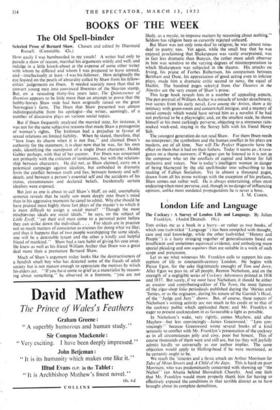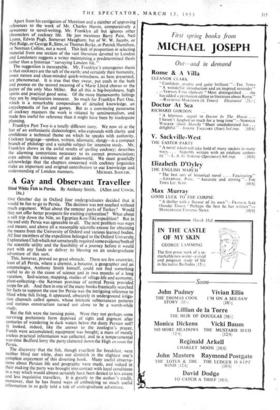London Life and Language
The Cockney : A Survey of London Life and Language. By Julian Franklyn. (Andre Deutsch. I 8s.) THIS strikes me as a book in a hurry—or rather as two books, of which one (sub-titled "Language") has been compiled with thought, care and real knowledge, while the other (sub-titled "History and People") is a hasty stringing together of generalisations based on insufficient and sometimes equivocal evidence, and embodying more special pleading and non sequiturs than are suitable in a work of such scope and pretension.
Let us see what witnesses Mr. Franklyn calls to support his con- ception of life in nineteenth-century London. He begins with Pierce Egan, for the sake (legitimately enough) of Tom and Jerry. After Egan we pass to, of air-people, Renton Nicholson, and on the strength of a negligible series of Cockney Adventures printed in 1836 and 1837. But surely, if we must have Nicholson, it should be either as creator and contributing-editor of The Town, the most famous of the cigar-shop folio periodicals published during the 'thirties and 'forties, or as the orginator, during his tenure of the Garrick 's Head, of the "Judge and Jury" shows. But, of course, these aspects of Nicholson's writing activity are not much to his credit or to that of the cockney public which applauded them; and Mr. Franklyn is eager to present cockneydom in as favourable a light as possible.
In Nicholson's wake, very rightly,, comes Mayhew, and after Mayhew—but less convincingly—James Greenwood.' "Less con- vincingly" because Greenwood wrote several books of a kind seriously to conflict with Mr. Franklyn's presentation of the cockney as in all circumstances jolly and cosy, poor but honest. This of course thousands of them were and still are, but (as they will joyfully admit) hardly so universally as our author implies. The same objection would apply to Hollingshead if he were mentioned, as he certainly ought to be.
We reach the 'nineties and a fierce attack on Arthur Morrison for Tales of Mean Streets and A Child of the Jago. This is hard on poor Morrison, who was predominantly concerned with showing up "the Nichol" (an Alsatia behind Shoreditch Church). And one feels that Mr. Franklyn would more properly thank him for having so effectively exposed the conditions in that terrible district as to have brought about its complete demolition. Apart from his castigation of Morrison and a nnmber of approving references to the work of Mr. Charles Harris, comparatively a newcomer to novel-writing, Mr. Franklyn all but ignores other chroniclers of cockney life. He just mentions Barry Pain, Neil Lyons, Edwin Pugh, Somerset Maugham; but of W. W. Jacobs, or Pett Ridge, or George R,Sims, or Thomas Burke, or Patrick Hamilton, or Norman Collins, not a word. This lack of proportion in selecting material from one section of the vast literature devoted to London and Londoners suggests a writer maintaining a predetermined thesis rather than a historian "surveying London life." The suggestion is inescapable. Mr. Franklyn's courageous thesis is that cockneys are the salt of the earth; and certainly their humanity, sweet nature and clean-minded quick-wittedness, as here presented, are phenomenal. It is true that they swear, put coals in the bath and pounce on the second meaning of a Marie Lloyd chorus or the patter of the only Max Miller. But all this is big-boyishness, high spirits and practical good sense. Of the more blameworthy failings they are by implication innocent. So much for Franklyn Part One, which is a remarkable compendium of detailed knowledge, an encyclopaedia of fun and games. But as a convincing panorama of cockney manners the work is vitiated by sentimentalism, and made less useful for reference than it might have been by inadequate planning.
Franklyn Part Two is a totally different story. We now sit at the feet of an enthusiastic dialectologist, who expounds with clarity and confidence a technical theme on which he speaks with authority. Cockney language—spoken, written, idiomatic, slangy—is a compact branch of philology and a suitable subject for intensive study. Mr. Franklyn shows us the awful results of spelling cockney; describes the alarming contortions necessary to its correct pronunciation; even admits the existence of an underworld. We must gratefully acknowledge that the chapters concerned with cockney linguistics make an important and original contribution to our knowledge and



































 Previous page
Previous page